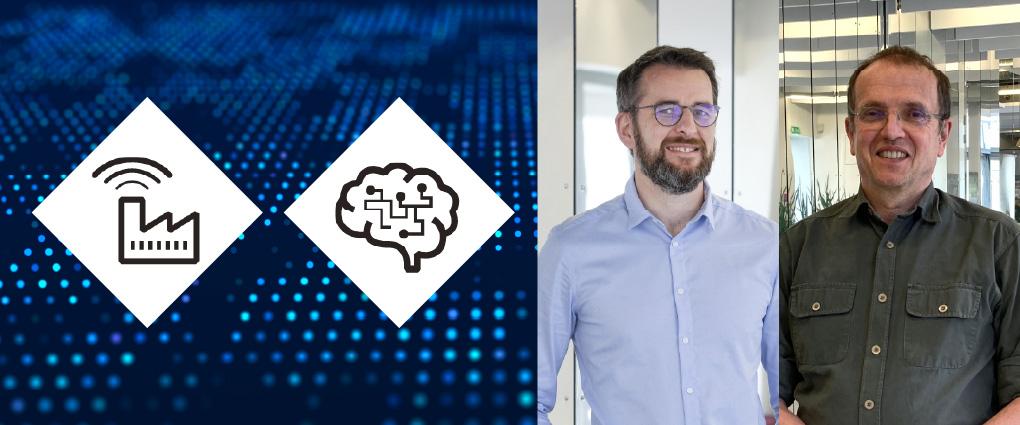In the image of the AI Action Summit and the massive investments announced in the sector, France is, more than ever, embracing the challenges of artificial intelligence. However, SMEs and ETIs are encountering obstacles in adopting this technology in the industry and are not yet exploiting its full potential. How can b<>com help these companies leverage AI to increase their competitiveness tenfold? Thierry Lucidarme, Executive Director of Innovation and Performance Strategy, and Jérôme Royan, AI/VR/AR/ Senior Scientist, take stock.
Concretely, how can AI optimize industrial processes?
We have identified several areas where AI can help optimize industry processes. In the broadest sense, logistics is one of them, where AI can automate and optimize tasks such as planning and inventories. Demand forecasting and vehicle fleet management are other examples. These are subjects on which our researchers are already working; for example, b<>com is developing an AI-based tool for TDF to optimize the daily rounds of TDF technicians and define an ideal route according to several criteria.
Production processes are also concerned with task programming, production line reorganization, and robotic automation. We can also mention quality control, manufacturing defect detection, maintenance, etc. The list is extensive! But you still need to be able to deploy solutions that make it possible. However, some manufacturers realize that when they have deployed AI, it is still very rarely adapted to their concrete needs. Sometimes, they also find that it doesn't interface appropriately with their systems. These are real obstacles to the development and competitiveness of companies. To reap the benefits of AI, we need to work closely with the company's core businesses.
Data collection and preparation: the keys to a more efficient AI?
Manufacturers have a multitude of data from various sources (sensors, industrial software, digital twins, etc.) at their disposal. However, very few of them are already structured to be adequately exploited by AI. However, the benefits of AI in an industry mentioned earlier are only possible if we aggregate and structure this data to drive AI models. Preparing data to drive AI models that specifically meet each industry's needs is an essential challenge! To achieve this, we need to provide them with tools to quickly prepare their data for training AI models (whether or not this data is collected in real-time).
We aim to create a sovereign platform capable of efficiently collecting and aggregating this data to train AI models for various industrial tasks (scheduling, prediction, optimization, simulation, analysis, 3D reconstruction, localization, etc.). At present, many AI models are trained on large datasets, but they don't meet the industry's specific needs. Hence, there is a need to refine these models based on data held by manufacturers to make them much more effective.
We also pay attention to the ethics of the data used to train AI models in data collection, storage, and preparation. Indeed, developing intelligent tools to facilitate data annotation will allow us to free ourselves from the massive exploitation of shadow workers worldwide who annotate training data all day long.
The expected benefits are manifold. The platform will enable manufacturers to interact more effectively with their data sources and better manage and query them naturally without needing advanced technical skills. It will also allow to design of AI models trained on these data and business applications, aiming to optimize the industrial processes mentioned above.
Will this AI platform be suitable for SMEs and ETIs?
Several SME profiles will find joining the program we're launching interesting. For SMEs that have already deployed AI in their system but are not fully satisfied with it, the IRT will offer support to optimize the existing system and provide a simple, personalized, and concrete response to the specific problems of each by adapting to the processes already in place. For SMEs that have not yet taken the plunge, b<>com will begin by diagnosing existing processes. A method already tried and tested with our member Ekinops, with the establishment of a diagnosis on predictive maintenance of optical transport and access networks, we evaluate together different approaches (such as AI or machine learning), enabling the anticipation of component failures via the analysis of data collected in real-time and recorded data.
Whatever the degree of installation of AI in industrial processes, b<>com adapts to each partner's specific constraints and challenges to meet them fully; this approach seems particularly useful for medium-sized and intermediate structures. They can benefit from the advantages of b<>com's innovation circle: the IRT takes charge of the administrative side of setting up and financing the project. Participants can pool costs and benefit from a leverage effect on project financing.



